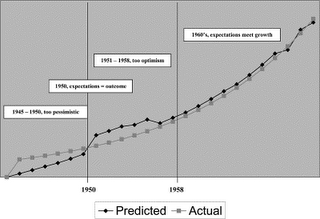
It's irrevocablely true that to forecast the future to an exact degree is whole heartedly too difficult to do. Speculation; however, on the possibilities of an upcoming future from an ever changing present remain to be conditioned on solid facts. Solid facts are all we have to go on. Speculation is premissable, but better determined with what we already have. Bush's stimulating look into the future, which is our present, sets a good tone on permissable speculation into an unforseeable future. Bush states in his hypothesis that "The world has arrived at an age of cheap complex devices of great reliability; and something is bound to come of it." Something has...a technological explosition of complex devices made for multipurposes still yet to be determined. Why is this so important to us? Why do read Bush's hypothesis and be amazed at his conceptual framework of how the world would be?
From speculation to understanding how things came to be is also very important in developing new ideas emulating early innovator's creativity for progression and supervening necessity. I think understanding our past helps establish our future. In the information age, why wouldn't this be true?
Predicting the market evolution of computers: was the revolution really unforeseen.
There is a lot of speculation as to how and why computers came to be in today's world. Winston suggests that the diffusion of computers may have been delayed for reasons he includes as complex computer language guarded by computer programmers who may have wanted to monopolize the information, the incunabula era had a massive expensive computers that lead away potential buyers, and even going away from smaller functional computers that may have been more affordable. The Baby Mark I was a smaller computer that never got much attention for reasons that are still speculated.
I would have to agree with Schnaars & Carvalho that the driving force of the evolution of computers was founded in the market. I do admit that Winston made a good point in the beginning that the diffusion of the computer was kept alive by the inclustion of warfare. Schnaars & Carvalho agrue that the computer began to be talked up to much that a 'keep up with the Jones' mentality began to shape the industry. Companies would purchase computers so not to be beat out by their competition. Market competition sparked innovation and the industry of computers skyrocketed. I would agrue myself that the 'keep up with the Jones' mentality still pushes the computer market forward as new technological innovations enter the market place.
Source
Title
Predicting the market evolution of computers: was the revolution really unforeseen
Schnaars, S. P.; Carvalho, S.
Technology in Society, vol. 26, no. 1, pp. 1-16, Jan. 2004
1 comment:
"I think understanding our past helps establish our future."
I agree in general this is very useful. How can our past tell us much about this age, however? When in history has technology ever changed so quickly? People are still alive today and when they were born, people didn't drive cars, have phones, tv's, computers, washers, hadn't been to the moon, didn't fly. The amount of change in the last hundred years is amazing. I think the main thing the past can tell us is that future change will be exponential, and beyond our wildest guesses.
Post a Comment